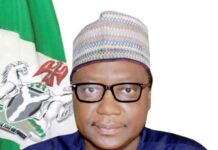The Honourable Minister of State for Petroleum Resources, Dr. Emmanuel Ibe Kachikwu has posited that the Federal Government’s policy on gas flaring as encapsulated in the National Gas Policy and as approved by the Federal Executive Council in June, 2017 must be taken to its logical conclusion with all the benefits to the nation there from.
Kachikwu restated that gas flaring is unacceptable, and must be phased out completely.
Dr. Kachikwu made this known at an International Press Briefing held on 11th April, 2019 at the Petroleum Development Fund (PTDF) Tower, Abuja. The theme of the Press Briefing was “The Journey so far and the Next Line of Action for the Nigerian Gas Flare Commercialization Programme (NGFCP)”.
Kachikwu emphasized that the Federal Government’s Gas Policy is further to ensure that FG takes measures to develop flare capture and utilization projects, that collaborations are made with industry, development partners to provide flare capture technologies and third party investors.
In terms of the Nigerian Gas Flare Commercialization Programme (NGFCP), the Honourable Minister described the enactment and approval of the Flare Gas (Prevention of Waste and Pollution) Regulations, 2008 and the signing of the Regulations by President Muhammadu Buhari on 5thJuly, 2018 as “key accomplishment”, “historic” and “record breaking.”
The Minister also revealed the setting up of the NGFCP Ministerial Steering Committee as well as the Programme Management Office (PMO) as additional stages in the evolution of the Nigerian Gas Flare Commercialization Programme (NGFCP).
He disclosed to the forum that he has also approved additional guidelines to support the Regulations. Along this line, he said he has directed the two bodies to activate the NGFCP Community and Awareness and Sensitization/Participation Plan (CASP) to ensure widespread, ongoing and meaningful sensitization and participation of key stakeholders in the Niger Delta Communities.
While declaring the Submission of Qualifications (SOQs) ceremony open, Dr. Kachikwu further revealed that Proposal Evaluation Committee (PEC) has been inaugurated to include members from the Ministry of Petroleum Resources (MPR), the Department of Petroleum Resources (DPR) and Nigerian National Petroleum Corporation (NNPC). The PEC membership, the Minister disclosed include Three (3) Nominees of the United States Agency for International Development (USAID) Advisory Team, three (3) from the Nigerian Extractive Industry Transparency Initiative (NEITI), two (2) member nominees from Oil Producers Trade Section (OPTS) as Independent observer groups (IOG).
The Proposal Evaluation Committee (PEC), the Honourable Minister stated, should evaluate the submission of qualifications and determine which applicants are qualified. The body should also evaluate the proposals submitted by qualified applicants in line with the criteria of the Request for Proposal package.
Kachikwu also charged the Petroleum Trust Development Fund (PTDF) to join the Nigerian Gas Flare Commercialization Programme in a Joint Implementation Committee. The Joint Implementation Committee is to build collaborative partnership and competence development framework for the Nigerian Gas Flare Commercialization Programme. The PTDF is further charged to enable the partnership and competence development.
The Minister commended all partners and stakeholders for their various roles at seeing that the Nigerian Gas Flare Commercialization Programme has come so far.
The Nigerian Gas Flare Commercialization Programme when fully consummated will lead to significant social and economic benefits to host communities in the Niger Delta, to investors and to the nation’s economy. From it, pollutions in the local Niger Delta communities will be curbed; households will be provided with clean energy; particularly Liquefied Petroleum Gas (LPG) for cooking; jobs will be created for small and medium scale business men who are in the value chain for gas; gas-to-power generation for electricity will be enhanced; as well, there will be gas to petrochemicals – fertilizers, poly propelene, poly ethylene, methanol, and others. Perhaps the greatest of the gains will be the alleviation of social unrest in the Niger Delta region.
Signed:
Olujimi Oyetomi
Deputy-Director, Press
Ministry of Petroleum Resources.





